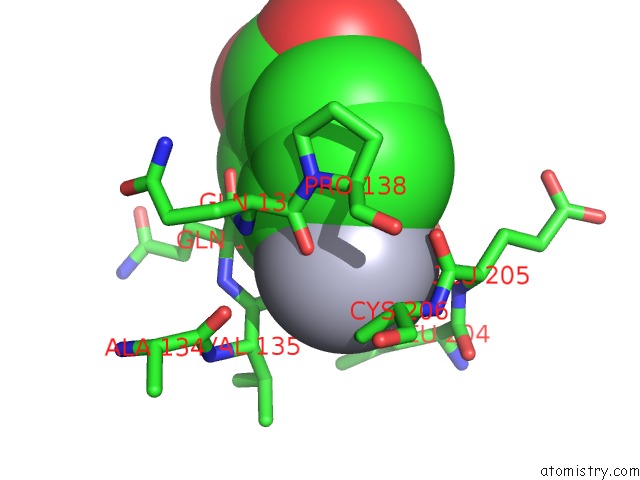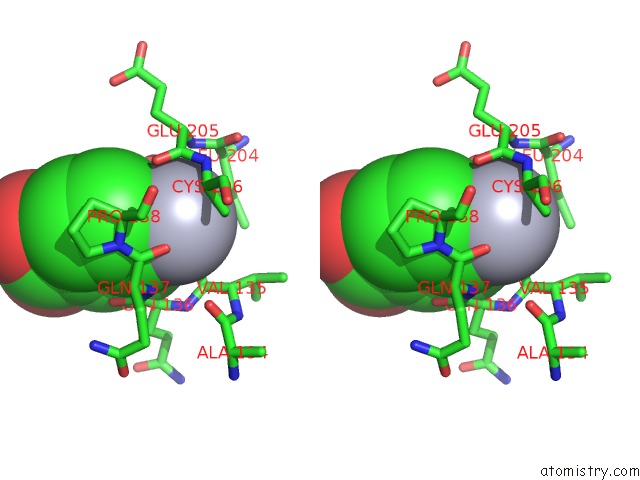Mercury »
PDB 4q81-5c9l »
4q9y »
Mercury in PDB 4q9y: Crystal Structure of 3-Methylthiophenol Bound to Human Carbonic Anhydrase II
Enzymatic activity of Crystal Structure of 3-Methylthiophenol Bound to Human Carbonic Anhydrase II
All present enzymatic activity of Crystal Structure of 3-Methylthiophenol Bound to Human Carbonic Anhydrase II:
4.2.1.1;
4.2.1.1;
Protein crystallography data
The structure of Crystal Structure of 3-Methylthiophenol Bound to Human Carbonic Anhydrase II, PDB code: 4q9y
was solved by
D.P.Martin,
S.M.Cohen,
with X-Ray Crystallography technique. A brief refinement statistics is given in the table below:
| Resolution Low / High (Å) | 35.62 / 1.55 |
| Space group | P 1 21 1 |
| Cell size a, b, c (Å), α, β, γ (°) | 42.197, 41.442, 71.970, 90.00, 104.34, 90.00 |
| R / Rfree (%) | 15.9 / 19.7 |
Other elements in 4q9y:
The structure of Crystal Structure of 3-Methylthiophenol Bound to Human Carbonic Anhydrase II also contains other interesting chemical elements:
| Zinc | (Zn) | 1 atom |
Mercury Binding Sites:
The binding sites of Mercury atom in the Crystal Structure of 3-Methylthiophenol Bound to Human Carbonic Anhydrase II
(pdb code 4q9y). This binding sites where shown within
5.0 Angstroms radius around Mercury atom.
In total only one binding site of Mercury was determined in the Crystal Structure of 3-Methylthiophenol Bound to Human Carbonic Anhydrase II, PDB code: 4q9y:
In total only one binding site of Mercury was determined in the Crystal Structure of 3-Methylthiophenol Bound to Human Carbonic Anhydrase II, PDB code: 4q9y:
Mercury binding site 1 out of 1 in 4q9y
Go back to
Mercury binding site 1 out
of 1 in the Crystal Structure of 3-Methylthiophenol Bound to Human Carbonic Anhydrase II

Mono view

Stereo pair view

Mono view

Stereo pair view
A full contact list of Mercury with other atoms in the Hg binding
site number 1 of Crystal Structure of 3-Methylthiophenol Bound to Human Carbonic Anhydrase II within 5.0Å range:
|
Reference:
D.P.Martin,
P.G.Blachly,
J.A.Mccammon,
S.M.Cohen.
Exploring the Influence of the Protein Environment on Metal-Binding Pharmacophores. J.Med.Chem. V. 57 7126 2014.
ISSN: ISSN 0022-2623
PubMed: 25116076
DOI: 10.1021/JM500984B
Page generated: Sun Aug 11 05:27:25 2024
ISSN: ISSN 0022-2623
PubMed: 25116076
DOI: 10.1021/JM500984B
Last articles
Cl in 3LZ0Cl in 3LUB
Cl in 3LXT
Cl in 3LXV
Cl in 3LWF
Cl in 3LXQ
Cl in 3LX4
Cl in 3LVP
Cl in 3LW1
Cl in 3LVY